The Beatles sang ‘A love like ours could never die as long as I have you near me’. These four couples tell Vandana Menon how they have navigated life together, through thick and thin
Grow old along with me, the best is yet to be. -Robert Browning
Communication and staying connected
In one’s relationship with one’s spouse, nothing is more irritating than feeling like you are not heard and nothing as enriching as having good communication.
Anjolie Menon at 80 is going strong and enjoying her days working at the studio, spending time with family, reading and watching shows and movies on Netflix.
Raja at 81 is actively writing for journals and newspapers and even joining Zoom conferences. His Navy background enables him to stay focused on his walks and yoga routine.
Given that you met at a very young age – you were in Delhi for your Undergraduate and Raja at National Defence Academy in Khadakwasla, how did you keep communication alive?
Anjolie: In those days we could only communicate through inland letters, so we would write the occasional letter, that was our only means of communication.
I had a friend whose father was the commandant of the NDA, so I went quite often to visit this friend, ostensibly, and I was able to meet Raja and was able to be there for his passing out parade when he won the gold medal.
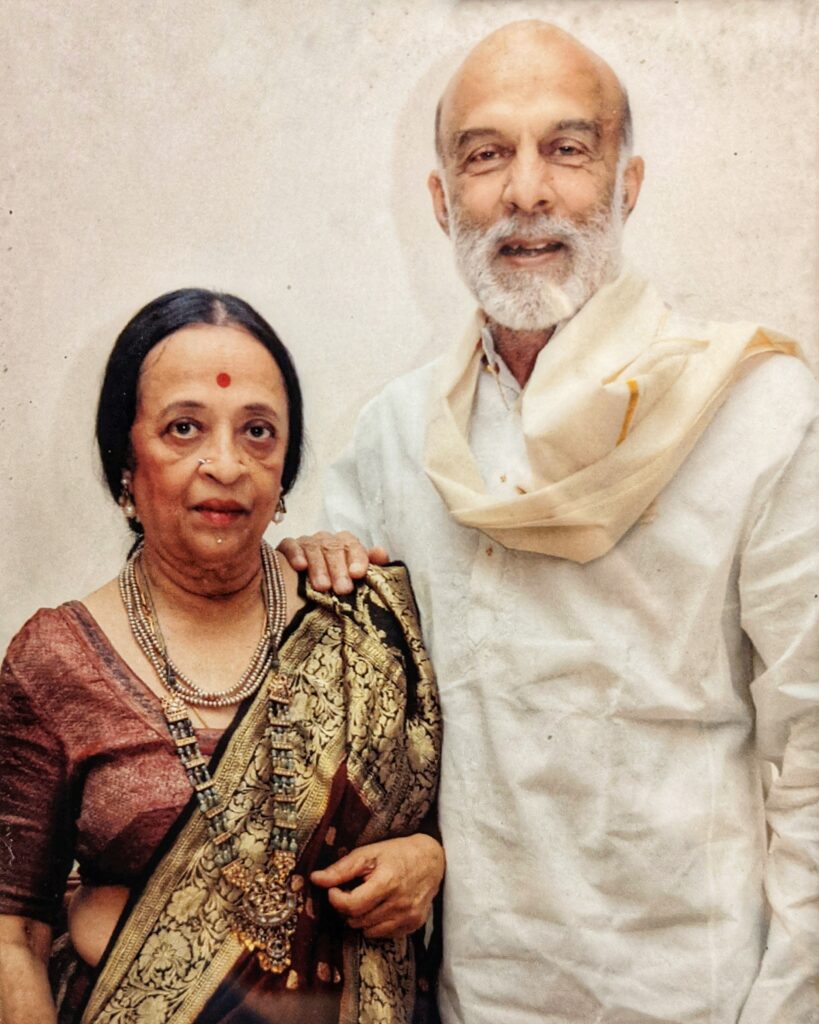
What about the time it was completely long-distance?
Anjolie: Letters, only letters. Then I also went off to Paris to finish my degree and Raja went aboard a ship, so the letters were few and far between but we carried on corresponding
In your days on a ship and a submarine, how did you stay in touch and keep your connection alive with Anjolie?
Raja: That was virtually impossible, in those days ships went out for a summer cruise which was normally for 2-3 months, via Chennai and Vishakhapatnam and you could only send letters from the harbour which was only once every two weeks or so. Similarly, we had another cruise in the winter for about three months where there were very hectic exercises in the Indian Ocean and that was life at sea. But of course, if you were posted ashore you went home every evening at five o’clock.
And on a submarine?
Raja: On a submarine, of course, it was a difficult life, don’t want to think about it (laughs)
How did you cope with non-family postings?
Anjolie: It was very difficult to cope because I had the two little kids to manage and I remember making a move from Vizag to Mumbai all on my own, Raja was away at sea. Even when my first child was born, I was in Lucknow with my parents- he wasn’t there, he came to visit on leave but was recalled to give witness at a court martial. So, he stayed for one day but then didn’t see his son for five months. We had a lot of difficult times, I had to manage everything. During the move I had to manage shifting with two kids, including unloading the car from the train and driving it back and staying in temporary accommodation. I was left to do that.
So, in those times how did you manage your relationship?
Anjolie: No, we were very happy to see each other after many days and a big relief after he came home. But there’s a big brotherhood in the Navy, so others help out, in fact, the children and I stayed with another couple for almost a month. The young officers would come over and offer help and one of them who has remained a good friend taught the children how to swim.
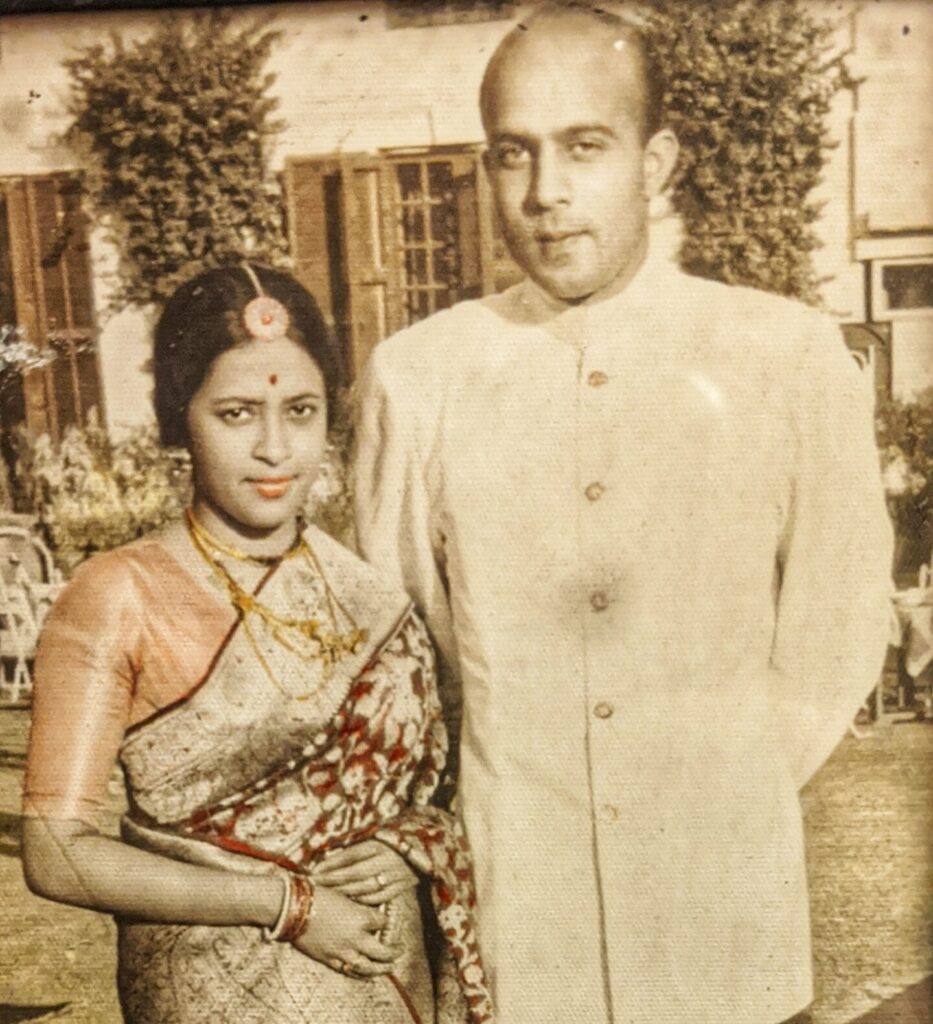
What is your view on communication with your spouse?
Raja:Husbands and wives may have different interests in life but communication together is a good thing- they must do something together in a day, even if itis watching television. The main thing is that they should retain a sense of humour, particularly to get them through tough times. As Anjolie was saying the Navy is a hospitable service and if a family has no children and a spare bedroom you were always welcome to share the flat.
What activities do you enjoy doing together?
Raja: We didn’t have common interests that way, except for reading very deeply into subjects and we had a similar educational background so held fairly common views on major issues but I took up carpentry and did whatever I could in the days we couldn’t afford a carpenter for her framing and painting and all that and she took an interest in culinary activities and used to do quite a lot of the cooking at home.
Anjolie – Now we’re really locked down 24/7! So we are doing everything together. We listen to music, we argue, we chat, we talk about politics, go for a walk in the evening. We used to do yoga with the yoga teacher and go to the gym every other day and we had a hectic social life, visit lots of very old friends. I am not talking of the Covid times but we often had our friends over for sit-down dinners that I enjoyed throwing and Raja likes having someone over with whom he can have an intelligent conversation with and engage with on current affairs.
What would you say is the strength of your ability to communicate with your spouse as you’ve both grown together over the years?
Anjolie: We have actually known each other for some 50… something like 58
Raja corrects: 62 years
Anjolie continues, 62 years, so sometimes it’s just not necessary to communicate. We enjoy a certain telepathy. I know what he’s going to say and he knows what I’m going to say. Often, we disagree about social issues and current affairs – he tends to be, which I have laughingly said – he belongs to that male chauvinistic generationwhere the roles were clearly defined. Actually, I have disappointed a lot of my feminist friends by saying that I have really enjoyed the traditional role of a woman, I loved raising the children, having them, being at home and not having to run away to an office, or run off to sea as he did. So, during our long-married life I think he had a tougher time than I did.
Anjolie: You didn’t ask me how he proposed to me… or not.
He did not?
Anjolie: He was so confident that I was going to marry him that he just asked my father and when my father agreed he just came to me and said we have to fix a date. He never said ‘Will you marry me?’
Raja: Yeah in those days you couldn’t do anything without parent’s permission, and my mother had passed away so there was some difficulty in that area.
Anjolie: When we celebrated his 60th birthday he was meant to marry me again, in the ceremony called Shashtipoorthi. He actually had the cheek to say that he will exchange me for two 30-year-olds!
Through Thick and Thin is not just a saying
Krishan Lal Chugh has only just hung up his boots at 83. As Chairman Emeritus of ITC and after 23 years as the Chairman of Gati Ltd, he has had his hands full.
Kamal Chugh has been a lecturer and teacher from right after her Masters in Sanskrit. She has spent many years at the helm of several organisations in the social service sector.
How have you kept a balance between the attraction of the high life and a mundane daily routine?
Kamal: I’ve never had ostentatious tastes and unnecessary desires. In fact, Anjolie Menon once called me a Handloom Punjabi!I was keen to get a good education, had the desire to be a professional and I wanted to work before I got married. I enjoyed teaching and had taught at a college in Punjab and school in Hyderabad for many years. I was never very ambitious to have a high life so the corporate life was more a responsibility than an interest as I am completely comfortable with a traditional Indian lifestyle.
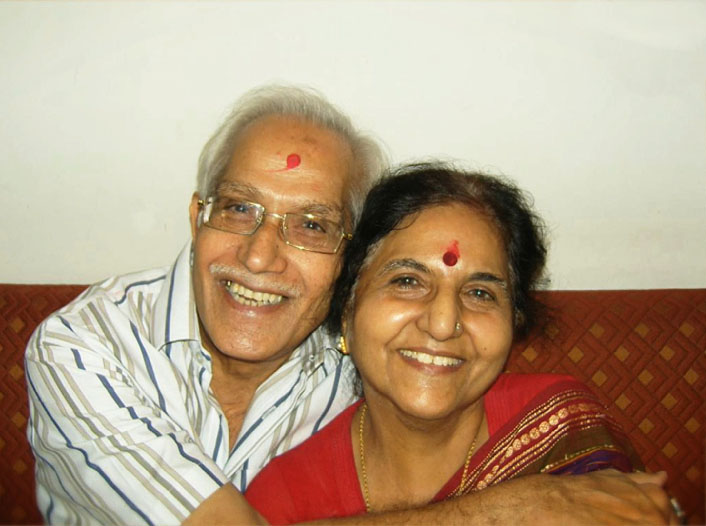
What do you recall as being something you have done that your spouse thought was special?
Krishan: Through my work, Kamal had the opportunity to work in 40 villages near the factory, I was building in a Naxalite area of Andhra Pradesh. In the late 70s I was able to arrange a car for her to travel into the forest and distribute medicines to the Naxalite families. That success was very satisfying for her and she had the opportunity to spread happiness. She continued to work with the villagers, especially the women and they together went on to change the villages at Bhadracham into Swachh Villages.
What has your role been in guiding your spouse when he had to make tough decisions?
Kamal: I have been very supportive of my husband in whatever way he wanted. I respected his wishes and the decisions he took in his life. That has helped him be confident of what he is doing. We have often talked and he discusses his thoughts with me too.
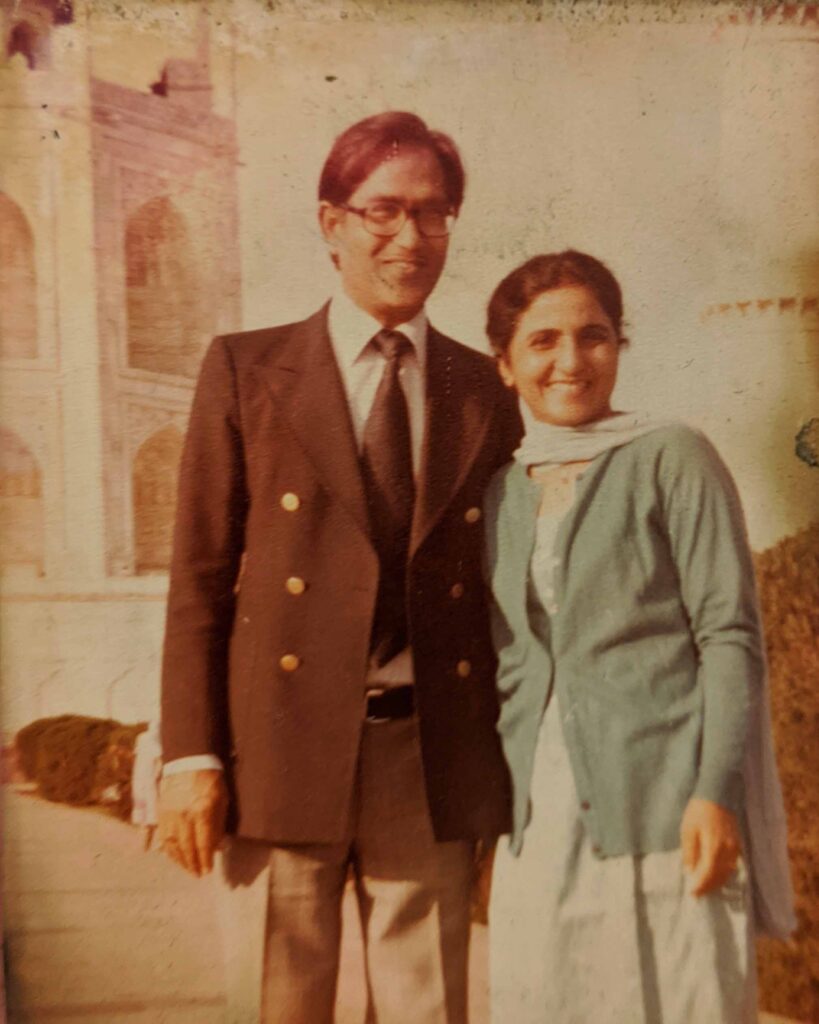
How have you coped with the effect your challenges have had on your spouse?
Krishan: I think if you have the support of your spouse in life’s tough times, then together the two can overcome anything. That has been my experience. Kamal has been my rock! We have been there for each other through the ups and downs of life. And that is what I have cherished over the years.
How would you guide the younger generation on values that that build a life together?
Kamal: The younger generation has to be inculcated with a good value system, personally I am conservative and was particular about traditional teachings – they are time tested.
I believe that’s how we have done well – with a good value system and hard work. That’s what I have laid stress on. The challenges today are societal but if children are taught, even by example of my generation, they will navigate through life and come out stronger.
Compatibility and Opposites Attract – how differences complement
Salman Haidar is a former Indian diplomat who served as the Foreign Secretary of India and also as High Commissioner of India to the United Kingdom. As a seasoned diplomat he had the trust and favour of several Prime Ministers of India.
Kusum Haidar is a veteran theatre actress, art director and Tai Chi exponent. After her early education in India, her stint in France, prolific years travelling with her husband, and acting in the Bhulabhai Desai Trust, Mumbai as well as under Ebrahim Alkazi, have contributed to her large, multicultural world view.

What was life like in the Foreign Service? How did you each engage in it?
Salman:It was unknown and a challenge. I had no idea of what it was like to be a diplomat. Diplomats were not born – they were made through the process of training. The Foreign Service is a really small service compared to the IAS. It’s much smaller and we have a professional pride in what we do. As a diplomat in the Foreign Service, very early in life our social commitments became a pattern of existence which we got attuned to and enjoyed.
Kusum: How we got together- just happened – we met at a very young age and I married Salman who was in the Foreign Service. I had led a very simple life, so after my marriage to him a whole new world opened to me because the Foreign Service meant travel and going to different places and meeting very interesting people – that made a difference to me. A lot of women in the Foreign Service said they felt like glorified hostesses and had to entertain – I never understood that. It started a new life of travel for me.
What has moulded you – made you who you are today?
Kusum: I was 16 when I joined theatre under Mr Alkazi. It was dramatic! (pun unintended)
I’ve done a lot of work in theatre, literature, direction and acting. Art was part of Mr Alkazi’s agenda as a teacher – he recently passed away. We attended his weekly talks on Art and nobody can ever forget his mark on them.
On one of my postings, I wasn’t too well and I was introduced to Tai Chi – and I enjoyed learning from a wonderful teacher and benefitted and I introduced it to many people and now I teach it too.
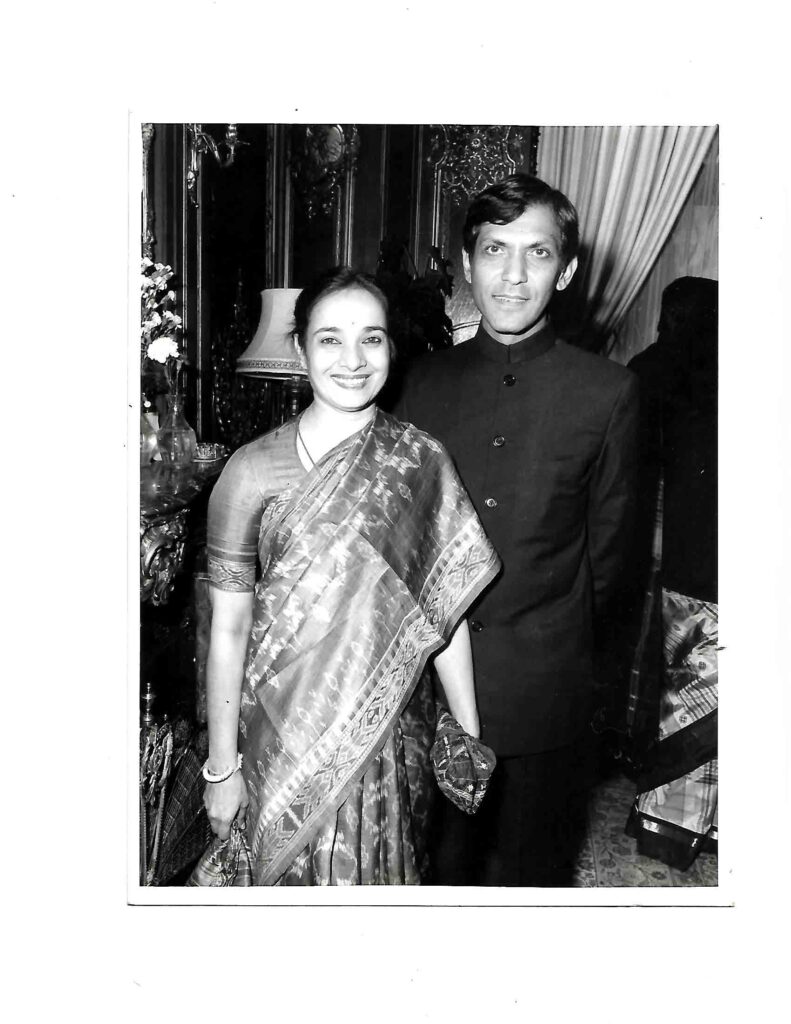
What has had a lasting influence on you?
Salman: When I joined, the head of the Service was the Prime Minister, Pandit Nehru, and he was particularly partial, in those days, to the Foreign Service. He put a mark on everything that we aspired to.
Kusum has always been engaged in theatre. So far as I am concerned, I have certainly been sustained by a community of Foreign Service people. We all back each other and we know each other and many of us are very great friends and have shared relationships. We have much in common that we take for granted and appreciate that it’s sustaining.
Would you say you are differently inclined? What are your common interests? Do you complement each other?
Kusum: (Laughs) We are both quite useless at numbers! I have had to live and learn and I’m getting better. He’s not very interested.
A lot of my friends are artists and that we share. Salman is ever ready to go to exhibitions because he has an interest in Art and likes to talk about it. And it’s been furthered by our daughter, Navina Haidar, who is an Art Historian (at The Met, New York). So, it’s in our blood, as it were.
Salman is very interested in books – he loves reading. He’s one of the good readers that I have met. Once he starts talking about a book, he will analyse it and he remembers things about it that many people forget.
We share a love for literature.
Interests and Passions
The couples are addressing aspects of a healthy relationship that go a long way in keeping each other positive and the home happy. They talk of their life experiences and their views.
In one’s relationship with one’s spouse, finding common ground to build a relationship on as one gets on in years, is a fundamental to staying engaged and interested in each other
Navin Chawla is a retired Senior Administrator who was the 16th Chief Election Commissioner of India, internationally recognised for impartially conducting the 2009 General Election. He has had compulsions of his professional responsibility take up his time for issues that are reasonably formal in their dispensation. Nowadays his interest in writing and his passion for the NGO he founded and supports takes up his time.
Rupika with her expertise in conservation of paintings and interest in murals, period paintings and antiques, has a more organic ability to engage with her work and passions. Her refined sense of aesthetic is admired by all.
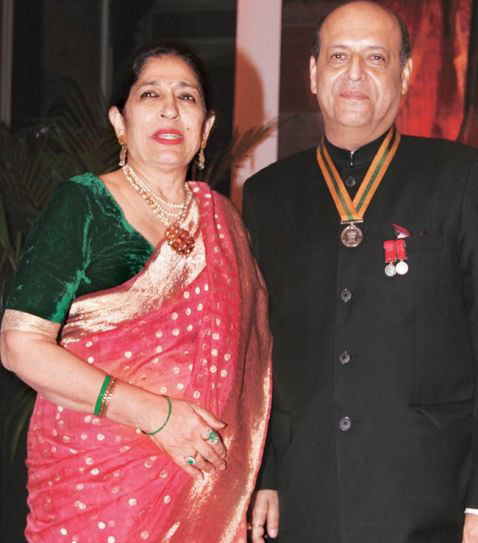
As a young couple how did you view Mr Chawla’s work?
Rupika: When I married Navin his first posting was in Delhi as Sub-Divisional Magistrate and he used to look after Tis Hazari and Shahdra, considered in those days to be troubled areas. I have always enjoyed listening to the intricacies of his civil service life and its many challenges. It was as a civil servant that he met Mother Teresa, a meeting that changed his life so completely.
When did you develop an interest in writing? Is authoring books a common interest between you and your spouse?
Navin: My interest in writing developed by accident. I was an IAS officer and the only writing I did was on files!
I had known Mother (now Saint) Teresa, for 15 years, when almost on impulse I asked her one day whether I could write her biography. She was initially very reluctant but after she finally gave permission, Rupika and I travelled to Kolkata together to embark on this journey. Although Mother gave me permission, I remained immersed in my work for the next three years. But I luckily got transferred to a lighter assignment and that enabled me to finish the book. Rupika helped throughout this journey.
Have you over the years made a conscious effort to find common ground in the things you both do as a couple?
Rupika: We had developed the thrill of collecting small antiques when Navin was posted to Pondicherry in 1979. When I studied conservation shortly thereafter, we understood the excitement of sorting out our little objects and our paintings that we had collected along the way. Once back in Delhi Navin had little time for such things while I found I had time to devote to our children, to conservation and to writing. While professionally he was busy, personally Navin always had a feel for art and the beautiful things of life so it was never difficult to find common ground. We have our little squabbles similar to most couples but they are about issues other than the passions that we share, interests that bring great compactness in our relationship.
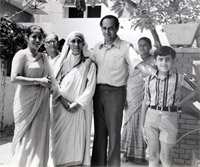
What do you think about commonality of views or do you find differences are healthy to inculcate?
Navin: In the early years of Rupika’s involvement in the art world, I was completely immersed in my Civil Service career. Her passion for contemporary art did not at first interest me, but we shared an interest in more conventional art such as the more realistic art as evidenced in Tanjore paintings, a passion we began to share when I was posted to Pondicherry in 1979 for a couple of years. Soon thereafter Rupika entered another world, that of art conservation which in turn led to her great interest in the 19th century painter Raja Ravi Varma. That opened other interesting doors for me, which were of course in complete contrast to my Civil Service life, but nonetheless one that began to interest me more and more. So too did her writing, particularly her spectacular work on Raja Ravi Varma. So, writing did become a shared interest as did art.
You are seen as a couple who actively support each other’s work and passion. What is your advice to younger people on working together in life with partners as a team (does contemporary living support or require this)?
Rupika: (Laughs) When we got married, we were the younger lot!
It’s not just today but I feel you have to manage the balancing act in any relationship, as also in a marriage. You have to view yourself as a unit if you want it to be a good marriage.
Each spouse has their individuality and you bring it out and you make it sparkle or make the light less according to the situation. If you always say I am an individual and I am the centre, you are not going to be able to manage it.
The little things that couples do for each have a great impact on their emotional wellbeing. The stories of Anjolie-Raja, Kamal-Krishan, Kusum-Salman, and Rupika-Navin tell us that a great companionship requires an ease in communication and the will to stay connected. Being able to lean on each other through the rough patches and standing tall for one another. It is about working through differences in a creative way, and paying close attention to each other’s passion and interest.



